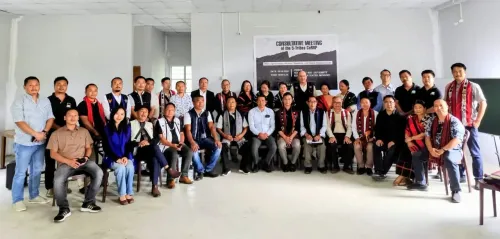Was Arun Jaitley Sent to Intimidate Rahul Gandhi During the Farm Laws Protest?

Synopsis
Key Takeaways
- Arun Jaitley allegedly threatened Rahul Gandhi during the farm laws protests.
- Gandhi accused the BJP government of undermining democratic institutions.
- He raised concerns about large-scale voter fraud since 2014.
- The speech highlighted the need for electoral integrity in India.
- Audience support indicates Gandhi's strong position within the Congress party.
New Delhi, Aug 2 (NationPress) During an impassioned speech at the All India Congress Committee's Annual Legal Conclave entitled 'Constitutional Challenges – Perspectives & Pathways', Rahul Gandhi, the Leader of the Opposition in the Lok Sabha, claimed that BJP leader Arun Jaitley was dispatched to intimidate him amid his opposition to the now-repealed farm laws.
"I recall when I was campaigning against the farm laws and he is no longer with us, but I must say this: Arun Jaitley Ji was sent to threaten me. He warned, ‘If you continue opposing the government, we will take action against you.’ I met his challenge directly, stating, ‘You clearly don’t understand who you’re dealing with. We are Congress members. We are not afraid,’" stated LoP Gandhi.
These comments were part of a broader critique of the alleged systematic erosion of constitutional institutions in India. He accused the BJP government of undermining democratic frameworks and jeopardizing the electoral process.
He reaffirmed his claims of widespread voter fraud and manipulation, especially since the 2014 general elections. “I always had a gut feeling that something was amiss. It began with Gujarat. The Congress didn’t secure a single seat in several states; it just didn’t make sense. When we raised questions, we were met with demands for proof,” he noted.
Referring to the party's detailed examination of voter data in Maharashtra, he elaborated: “We scrutinized thousands of voter photographs and names manually. In one constituency, 6.5 lakh votes were recorded, yet 1.5 lakh were found to be fraudulent. We obtained this information from the Election Commission in physical form, as they refused to provide electronic copies. The Election Commission has vanished; it no longer exists.”
While delivering his address, the audience erupted into chants such as “Desh ka raja kaisa ho, Rahul Gandhi jaisa ho.” However, LoP Gandhi firmly responded, saying: “I am not a monarch. I have no desire to be one. I reject that notion.”
The conclave, organized by the AICC’s Legal, Human Rights, and RTI Department, featured participation from prominent Congress leaders and legal experts.









